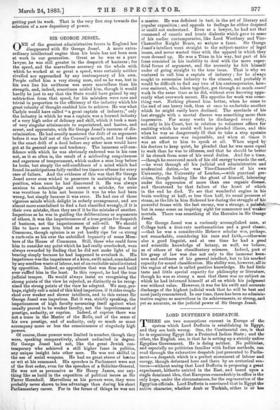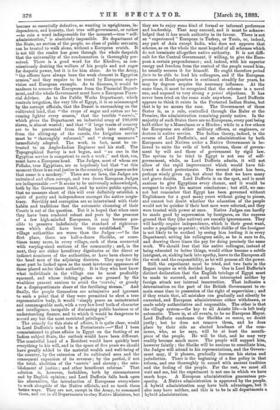LORD DUFFERIN'S DESPATCH.
become so essentially defective, so wanting in uprightness, in- dependence, and honesty, that true self-government, or rather —to coin a word indispensable for the moment—trae " self- administration," is absolutely impossible. No department of the State, no section of the people, no class of public servants, can be trusted to walk alone, without a European crutch. It is not till the reader has gone through the whole despatch that the universality of the condemnation is thoroughly per- ceived. There is a good word for the Khedive, as con- scientiously desiring the welfare of his people and not eager for despotic power, but it is for him alone. As to the Army, "the officers have always been the weak element in Egyptian armies," and they require to be toned by European super- vision and European example. As to finances, it would be madness to remove the Europeans from the Financial Depart- ment, and the whole Government must have a European Finan- cial Adviser. As to the Public Works Department, which controls irrigation, the very life of Egypt, it is so mismanaged by the corrupt officials, that the Desert is encroaching on the cultivated land, that " the crops of sugar and cotton are be- coming lighter every season," that the terrible " corvee," which gives the Department an industrial army of 100,000 slaves, is almost wasted ; and that " if large tracts of country are to be prevented from falling back into sterility," from the silting-up of the canals, the Irrigation service must be " thoroughly reformed," and " strong measures " immediately adopted. The work, in fact, must be en- trusted to an Anglo-Indian Engineer and his staff. The Topographical Survey is not begun, and " no one in the Egyptian service is competent to such a work ;" and that, too, must have a European head. The Judges, most of whom are Pasha, true Egyptians, are so hopelessly bad that " at this moment there is no real justice in the country, what passes under that name is a mockery." There are no laws, the Judges are untrained and often corrupt, and two dozen European Judges are indispensable :—" It seems to be universally acknowledged, both by the Government itself, and by native public opinion, that no measure short of this will ever definitely establish a spirit of purity and independence amongst the native magis- tracy. Servility and corruption are so intertwined with their habits and traditions that the automatic cleansing of their Courts is out of the question. But it is hoped that when once they have been rendered robust and pure by the presence of a few high-minded Europeans, it may become pos- sible to preserve indefinitely the standard of righteous- ness which shall have been thus established." The village authorities are worse than the Judges :—"In the first place, there are half-a-dozen Sheikhs, or some- times many more, in every village, each of them connected with varying-sized sections of the community ; and, in the next, they are either hereditary dignitaries or the direct or indirect nominees of the authorities, or have been chosen by the head men of the adjoining districts. They may for the most part be looked upon as the most inveterate oppressors of those placed under their authority. It is they who best know what individuals in the village can be most profitably squeezed, and whose itching palms are greased by the wealthier peasant anxious to avoid the corv6e,' or greedy for a disproportionate share of the fertilising stream." And finally, the people themselves are submissive and ignorant to .such a point that if they were permitted to elect a true representative body, it would " simply prove an uninstructed and unmanageable mob, with a very low level both of character and intelligence, incapable of discussing public business or of understanding finance, and to which it would be dangerous to accord any but the most restricted privileges." . The remedy for this state of affairs, it is quite clear, would in Lord Dufferin's mind be a Protectorate :—" Had I been commissioned to place affairs in Egypt on the footing of an Indian subject State, the outlook would have been different. The masterful hand of a Resident would have quickly bent everything to his will, and in the space of five years we should
have greatly added to the material wealth and well-being of the country, by the extension of its cultivated area and the consequent expansion of its revenue ; by the partial, if not
the total, abolition of the 6corvee ' and slavery ; the este-
• blishment of justice ; and other beneficent reforms." That solution is, however, forbidden, both by circumstances and by English opinion; and Lord Dufferin falls back upon lila alternative, the introduction of Europeans everywhere to work alongside of the Native officials, and so teach them
better. ways. They are not, except in the Army, to command them, and are in all Departments to obey Native Ministers, but they are to enjoy some kind of formal or informal preference • and leadership. That may succeed, and it must be acknow- ledged that it has much authority in its favour. There is not an " experienced " European in Turkey, or Tanis, or, indeed, any part of Asia except India, who does not approve that scheme, as on the whole the most hopeful of all schemes which do not terminate altogether native authority. It is not diffi- cult for the Central Government, if willing, to give the Euro- pean a certain preponderance ; and, indeed, with his superior energy and freedom from the control of the people round him, he usually secures it for himself. He ought therefore primd fade to be able to lead his colleagues, and if the European pressure at Head-quarters is continued steadily for years, he may by degrees acquire the necessary influence. At the same time, it must be recognised that the scheme is a novel one, and exposed to very strong a priori objections. It has never been tried on the same scale anywhere. Lord Dufferin appears to think it exists in the Protected Indian States, but that is by no means the case. The Government of those States is, as a rule, controlled through the Ruler or the Premier, the administration remaining purely native. In the majority of such States there are no Europeans, every post being held either by a Mussulman or a Hindoo while in while few others the Europeans are either military officers, or engineers, or doctors in native service. The Indian theory, indeed, is the reverse of Lord Dufferin's, and an administration by both Europeans and Natives under a Native Government is be- lieved to unite the evils of both systems, those of govern- ment by will and those of government by rigid law. The system to be tried in Egypt is not one of self- government, while, as Lord Dufferin admits, it will not allow of the rapid improvement which would have fol- lowed a direct protectorate. The second object has been, perhaps wisely given up, but about the first we have many and grave doubts. Lord Dufferin is on the spot, and is most anxious to give Egyptians every chance, and it would be arrogant to reject his mature conclusions ; but still, we can- not but remember that Egypt has been governed without Englishmen for a good many years without going to pieces, and cannot but doubt whether the education of the people would not be quicker if their best men were selected, and they were trusted with power at once. Native Judges can hardly be made good by supersession by foreigners, on the express ground that they (the natives) are rascally ignoramuses. They will hardly acquire independence, which is their great want, under a pupillage so patent ; while their dislike of the foreigner is not likely to be soothed by seeing him lording it in every Department, setting his colleagues aside, as he is sure to do, and drawing three times the pay for doing precisely the same work. We should fear that the native colleague, instead of being educated to better things, would either become a subtle intrigant, or, sinking back into apathy, leave to the European all the work and the responsibility, as he will possess all the power.
Still, the experiment must be tried, and two facts in the Report inspire us with decided hope. One is Lord Dufferin's distinct declaration that the English tutelage of Egypt must be made to succeed, and must be interrupted neither by foreign attack nor internal insurrection. That indicates a determination on the part of the British Government to re- main some time in possession of the right of supervision ; and if they retain that, all mistakes can gradually and silently be corrected, and European administrators either withdrawn, or made solely authoritative and responsible. The other is that the village system—the key to all Asiatic life—is left truly automatic. There is, at all events, to be no European Mayor. Lord Dufferin condemns the Sheikhs en masse, no doubt justly ; but he does not remove them, and he does place by their side an elected headman of the com- mune, who, as he says, will be at least the mouth- piece of the people. He will be that, and he may very readily become much more. The people will support him, however faintly ; the Sheiks will be anxious to conciliate him, the Judges will attend to his representations, and the Govern- ment may, if it pleases, gradually increase his status and jurisdiction. There is the beginning of a fine policy in that reform, and one thoroughly in accord with ancient tradition and the feeling of the people. For the rest, we must all wait and see, but the experiment is not one in which we have much hope. A European administration guarantees pro- sperity. A Native administration is approved by the people. A hybrid administration may have both advantages, but it also may have neither, and this is to be in all departments a hybrid administration.



































 Previous page
Previous page